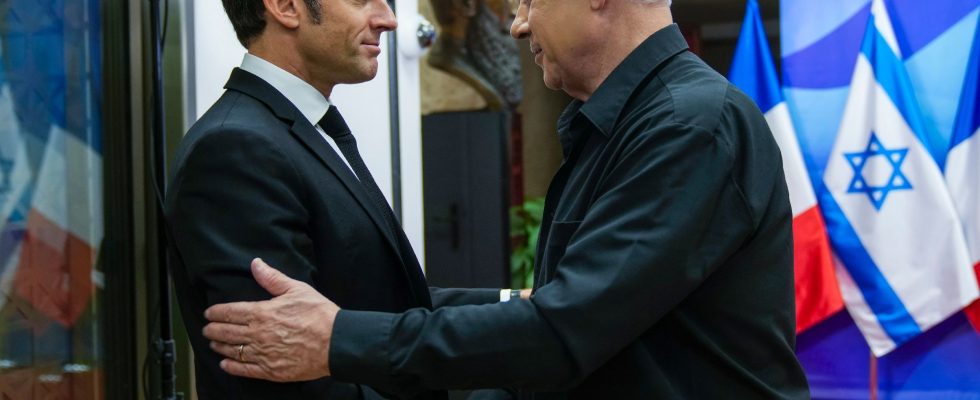On the sidelines of his trip to Israel this Tuesday, October 24, Emmanuel Macron called for the creation of an international “coalition” to fight against the Palestinian Islamist movement which controls the Gaza Strip.
“I propose to our international partners that we can build a regional and international coalition to fight against the terrorist groups that threaten us all,” insisted the French president after a bilateral meeting with Israeli Prime Minister Benjamin Netanyahu.
This, without dismissing the idea of expanding the “International Coalition”, also known under the name “Ineherent Resolve” (absolute determination in French, Editor’s note) set up in 2014 to fight the Islamic State (IS) group in Syria and in Iraq. Where does this international coalition against ISIS come from?
2014: birth of the international coalition
It was in the midst of the Iraqi and Syrian civil war that the alliance took shape in the summer of 2014. While Daesh is experiencing rapid growth in the Near and Middle East, some 80 countries, including NATO and the European Union, respond favorably to the invitation from the Iraqi government, determined to drive out any terrorist presence from its territory.
From September, the international coalition was on the move, providing support to local military forces, notably through bombings. At its head, the United States which is on the front line, and at the origin of the majority of strikes.
Among the main contributors are countries in the region, primarily Saudi Arabia and the United Arab Emirates. But also Jordan, Bahrain and Qatar.
Deployment of Operation Chammal in the Levant
On the French side, commitment within the International Coalition is taking shape through Operation Chammal which is structured around two main missions: advising and training the Iraqi army, and supporting the coalition forces against Daesh. This, “at the request of the Iraqi government and in coordination with France’s allies present in the region”, then specifies the French Ministry of Defense.
On September 19, 2014, a thousand French soldiers were mobilized on the ground between the Eastern Mediterranean, the air bases of Jordan and the United Arab Emirates, the various coalition headquarters – United States, Kuwait, Bahrain, Qatar , Iraq…-, as well as in Baghdad. Ten Rafales, six Mirage fighters, and a frigate are deployed. While carrying out intelligence functions for the benefit of the Iraqi government, France carries out almost daily strikes against the Islamic State using its fighter planes.
2015 and 2017: the French presence strengthens
However, it was not until September 2015 that the then French president, François Hollande, extended Operation Chammal to Syria “in order to reach the decision-making centers of Daesh”. This was delayed due to the war crimes committed by the Syrian head of state, Bashar al-Assad against his own population. The aircraft carrier Charles-de-Gaulle is then deployed off the coast of the Levant, with François Hollande on board, who is preparing to begin his first visit to the theater of military operations in the region.
But French commitment reached its peak in July 2017 with the liberation of Mosul, in Iraq. Three months later, it is the turn of the inhabitants of Raqqa in Syria to be freed from the yoke of Daesh, whose presence in the Levant is diminishing as the operation continues.
A “military victory”
“Thanks to the efforts of the coalition, since December 2017 in Iraq and March 2019 in Syria, Daesh no longer has territorial influence,” assures the French Ministry of Defense, which however warns: “This military victory must not make us forget that the threat remains and that the fight against terrorist groups continues.”
This is why 600 French soldiers are still present in the region as part of Operation Chammal. This, although the means have been reduced. The challenge remains mainly to prevent the reconstitution of terrorist groups, which would then once again upset the fragile balance in the region.
If the contours of President Macron’s new initiative in the Middle East still remain unclear, the President’s entourage assures AFP that they want to draw inspiration from the international coalition set up in 2014, and “see what aspects are replicable against Hamas. A ground offensive in Gaza, as envisaged by the Israeli army, “would be very difficult to carry out in compliance” with “international law”, it is added. But for now, any decision remains dependent on “what Israel will ask.”
